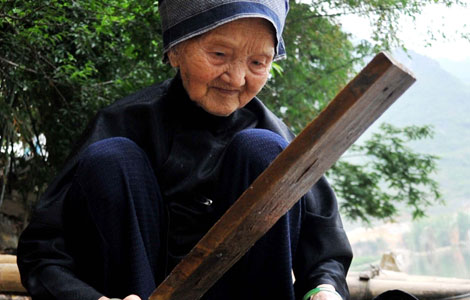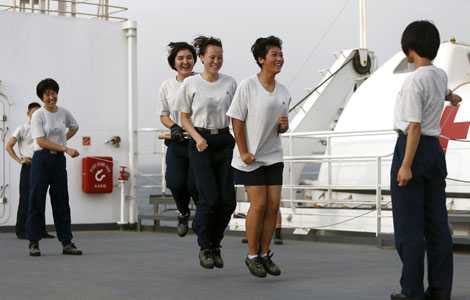China, Uzbekistan to deepen all-around cooperation
Updated: 2013-09-08 15:36
(Xinhua)
|
|||||||||||
TASHKENT -- China and Uzbekistan will continue to deepen cooperation in a variety of areas to advance their strategic partnership, Chinese diplomats have said.
Chinese President Xi Jinping will pay a state visit to Uzbekistan from September 8 to 10 at the invitation of his Uzbek counterpart, Islam Karimov.
In a recent interview with Xinhua, Chinese Ambassador to Uzbekistan Zhang Xiao said Xi's visit will reach a milestone in China-Uzbekistan relations as it has great significance for planning the future development of bilateral ties in the next decade or a longer period, enhancing cooperation and safeguarding regional peace, stability and development.
During Xi's visit, Zhang said, leaders of the two countries will exchange in-depth opinions on the international and regional situation and major issues as well as the future development of the bilateral relationship. They will also sign and publish a series of important documents.
Zhang said he is convinced that the fruitful achievements to be made during this visit will inject dynamism into the comprehensive cooperation between the two countries and lift bilateral relations to a new level.
China and Uzbekistan are enjoying deepening political mutual trust, effective cooperation on security and fruitful practical cooperation, Zhang said.
The two countries firmly support each other's efforts in safeguarding national unity and territorial integrity, Zhang said, adding that Uzbekistan always stands together with China on issues concerning China's Taiwan, Xinjiang and Tibet.
Both countries have maintained close coordination in jointly fighting the "three evil forces" of terrorism, extremism and separatism, ensuring the success of the 2008 Beijing Olympic Games and the 2010 Shanghai World Expo, the diplomat said.
Chinese counselor to Uzbekistan Wang Kaixuan told Xinhua the economic and trade cooperation between China and Uzbekistan has entered a fast track since Karimov's visit to China last June, when the two countries forged a strategic partnership.
China's statistics show that bilateral trade stood at 2.88 billion US dollars in 2012, up 32.8 percent year-on-year, and China has become the second biggest trading partner of Uzbekistan, Wang said.
Uzbekistan's statistics show that Chinese investment accounted for 35.6 percent of the total foreign investment in Uzbekistan, and China is Uzbekistan's biggest investor as a country, he added.
Bilateral trade has reached 2.54 billion dollars in the January-July period this year, a 60 percent increase year-on-year, Wang said, adding that their trade volume for 2013 is expected to reach nearly 4 billion dollars.
Wang said the two countries enjoy complementary advantages in economy, which can create broad space for the development of economic and trade cooperation. Uzbekistan boasts of rich gas and oil resources and mineral reserves, while China has a technological edge in energy, transportation, telecommunication, agricultural development, mechanical equipment, light industry and household appliances.
Meanwhile, their trade and economic cooperation pattern is witnessing positive changes as bilateral cooperation has expanded into investment and non-energy sectors.
Placing high importance on their cooperation in non-energy sectors, the two countries have been striving to broaden and enrich their cooperation, Wang said, citing the Pengsheng industrial park in Uzbekistan as an example.
According to Wang, the Pengsheng industrial park, the biggest non-energy cooperation project between the two countries, has already received a total investment of more than 43 million dollars. The joint venture has already implemented four production projects, and another three projects will be put into operation by the end of this year.
Currently, there are more than 410 Chinese companies registered in Uzbekistan, operating in a broad range of sectors including energy, resources, electricity, telecommunication, textile, agriculture, trade and construction contracting, Wang noted, saying they have made major contribution to Uzbekistan's economy.
In the field of culture and humanities, Ambassador Zhang said China and Uzbekistan are enhancing cooperation in education, culture, technology, sports and tourism and seeing frequent exchanges.
China has listed Uzbekistan as a tourist destination country for Chinese citizens, while more and more Uzbeks, especially young people, are learning Chinese language and culture, Zhang said.
The Confucius Institute in the capital of Tashkent has become an important base to teach the Chinese language and promote Chinese culture. A second Confucius Institute is expected to open soon in the country, Zhang said.
China offers 120 scholarships to Uzbekistan every year. The annual "Chinese Bridge" Chinese language proficiency competition for foreign students has become an important platform for Uzbek youngsters learning Chinese to showcase their talents. There is also an increasing number of Chinese young people studying in Uzbekistan, Zhang said.
In 2012, taking the opportunity of celebrating the 20th anniversary of the establishment of diplomatic ties and the forging of the strategic partnership, the two countries held a series of cultural exchange activities to deepen mutual understanding between the two peoples, advance people-to-people cooperation and exchanges to a record high level and consolidate the cultural and public basis for mutual friendship, Zhang said.
China and Uzbekistan also cooperate closely within multilateral frameworks such as the United Nations and the Shanghai Cooperation Organization (SCO), support each other's stance on major issues and safeguard their common interests, Zhang said.
As members of the SCO, Zhang said, China and Uzbekistan have maintained close friendly cooperation in politics, security, culture, trade and economy, worked together for regional security and common development, and contributed to the development of the SCO.
He said the active cooperation between the two countries within the SCO framework has become an important part of bilateral strategic coordination.
China is willing to maintain close cooperation with Uzbekistan within the SCO framework to promote the development of the organization and enable the bloc to play a bigger and more active role in safeguarding regional security and stability, Zhang said.
Related Stories
Xi's speech on China-Central Asia ties catches global attention 2013-09-08 13:32
Xi urges Chinese, Kazakh entrepreneurs to boost cooperation 2013-09-08 11:44
Cooperation with Kazakhstan enjoys broad prospect: Xi 2013-09-08 10:29
Xi discusses bilateral ties with Kazakh parliament speaker 2013-09-08 10:09
Today's Top News
Chinese president arrives in Uzbekistan for visit
Exports expand in August
Belgian PM 'confident' in China's economy
Beijing set to host global tourism center
Proposal requires bars to ban minors
Liu Zhijun associate charged
Network to take care of mentally ill
Guangzhou to end labor camps
Hot Topics
Lunar probe , China growth forecasts, Emission rules get tougher, China seen through 'colored lens', International board,
Editor's Picks

|

|

|

|

|

|





